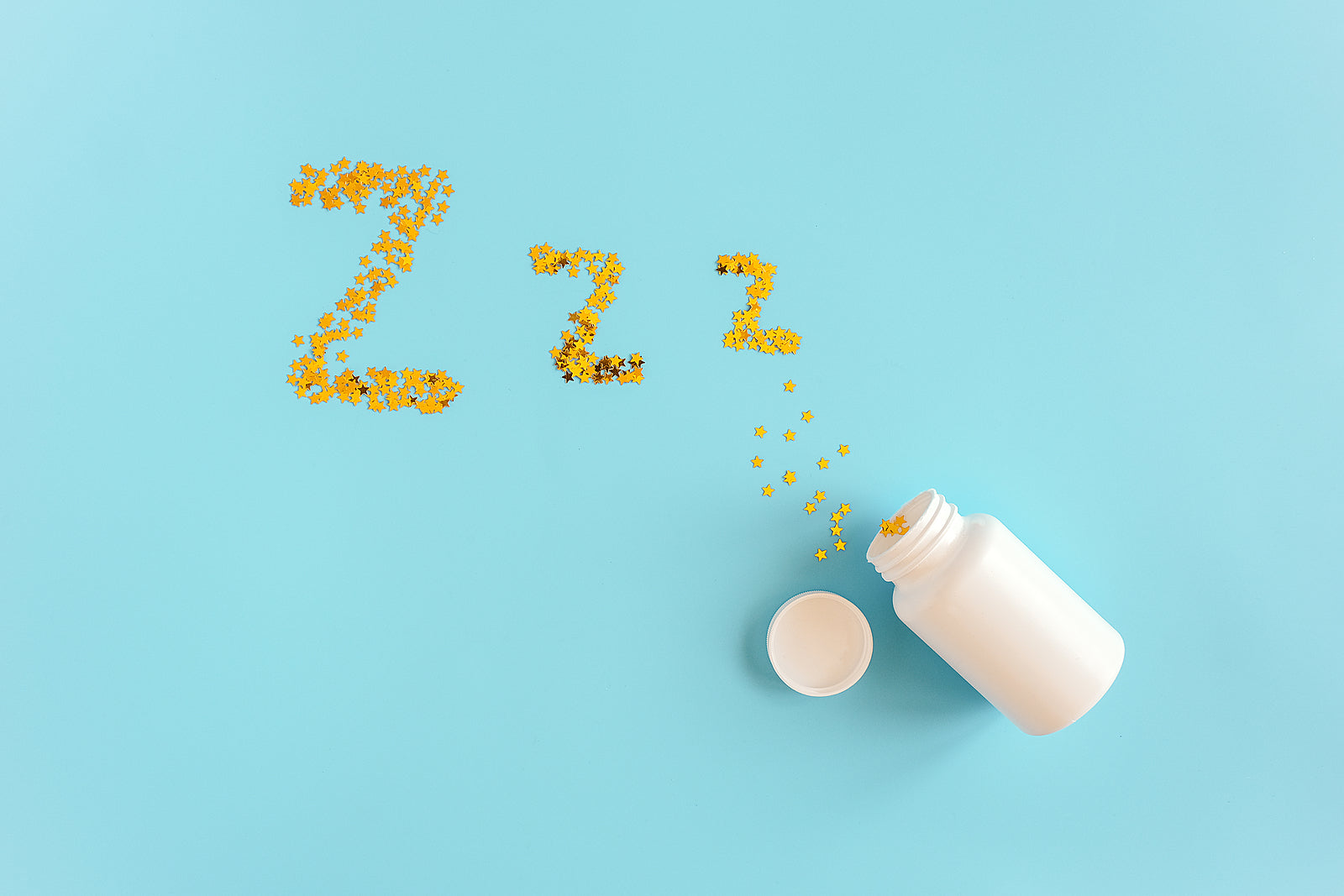One night of bad sleep is nothing to stress over.
But several sleepless nights back-to-back?
Sure, you can try changing up your sleep routine.
Maybe try going to bed earlier at a consistent time - and this will significantly help.
But if you’re feeling stuck in an insomnia loop, the problem could be deeper.
Key Takeaways
- Chronic low magnesium can make it harder for the brain and body to relax, contributing to restless nights and shallow sleep.
- Stress, sweat loss, processed foods, and certain medications all increase magnesium demand, which many modern diets fail to meet.
- Using a highly bioavailable magnesium alongside sleep-supportive nutrients can help calm the nervous system and restore healthy sleep patterns.
- Performance Lab® Sleep combines advanced NutriGenesis® magnesium with natural cherry-sourced melatonin and L-tryptophan for deeper, more restorative sleep.

One common issue when it comes to sleep quality: magnesium deficiency.
Surprisingly (or not surprisingly, if you’re a health fanatic like us), nutrient status can significantly impact sleep quality—and vice versa.
One such nutrient that’s important to sleep is magnesium, a mineral with wide-ranging effects on the brain and body. Magnesium supports blood pressure regulation and blood sugar control, which are crucial for overall health and sleep quality.
There are several reasons why magnesium deficiency is so common, most notably:
-
Ultraprocessed Foods - modern manufacturing and processing techniques often sap the micronutrient content of our favorite foods.
-
Sweaty Exercise and Activity - athletes are particularly at risk of magnesium deficiency, due to the loss of minerals via sweating.
-
Negative Ingredient Interactions - many pharmaceuticals and synthetic consumables compete with magnesium in the gut for absorption, resulting in poor magnesium bioavailability.
Without adequate magnesium available, the brain and body struggle to relax. And without proper relaxation, sleep is also a major struggle.
This is why magnesium for sleep has become such a popular topic.
Supplementing magnesium prior to bed may help combat magnesium deficiency in support of better, deeper, more restorative sleep.
And the best magnesium-containing sleep supplement for the job is Performance Lab® Sleep, an ultramodern sleep aid powered by all-natural relaxants and probiotic-cultivated magnesium.
But before diving into all that, let’s first address the basics. Starting with the most basic question we can ask here:
What is Magnesium?

Explaining “what is magnesium” is a lot like explaining a color.
It’s so elemental that it simply is what it is. How else do you explain the color “green” without simply pointing to something colored green?
With magnesium, it’s even more difficult: there’s nothing really to point at, unless you’re a high school chemistry teacher with a chunk of magnesium readily available.
And even so, a chunk of magnesium can’t really tell you much, other than that chunks of magnesium are kind of pretty in a metallic sort of way.
Simply put, magnesium is a mineral.
Specifically, magnesium is a mineral with the symbol Mg and atomic number 12 on the Periodic Table of Elements, and it’s a mineral that’s involved in more than 300 enzyme systems in the human body.
Directly involved in the neural synapse as a magnesium cation (Mg2+), this mineral is particularly important for nighttime cognitive and neuromuscular relaxation. Magnesium chloride, in particular, is known for its benefits in improving sleep quality and supporting mental health.
As an essential mineral, magnesium is required by the body to function, yet it can’t be synthesized by the body. Hence why it’s required—or essential—that we consume adequate amounts of magnesium from our diets, lest you drastically lower your life quality with magnesium deficiency (which we’ll detail below). However, be cautious with magnesium oxide, as it is poorly absorbed by the body.
Of course, magnesium supplements can help, especially if you’re taking magnesium for sleep. But it’s also important to look to natural sources for your micronutrient intake. When considering dietary supplements, always consult a healthcare provider to ensure they are appropriate for your needs.
Natural Sources
As a natural nutrient, it's best to acquire magnesium via natural sources (that tend to also come jam-packed with other essential micronutrients).
Some of the most magnesium-rich foods include:
-
Wheat Bran
-
Almonds
-
Spinach
-
Mixed Nuts
-
Peanut Butter
-
Potato
-
Pinto Beans
-
Brown Rice
-
Lentils
-
Bananas
-
Avocado
-
Dark Chocolate
In general, foods high in dietary fiber provide an exceptional amount of magnesium.
Many breakfast cereals also come fortified with magnesium; although, this is typically to replenish magnesium lost to the food processing of breakfast cereals and other fortified food options.
For a healthy increase in your dietary magnesium levels, look for green, leafy foods, such as spinach and swiss chard, as well as nuts, seeds, and (okay, fine) dark chocolate.
Signs and Symptoms of Magnesium Deficiency
Detecting mild hypomagnesemia (low magnesium) can be somewhat difficult, considering both how common it is and how “below the radar” many of the symptoms are.
Of course, acutely high magnesium deficiency shows familiar signs of muscle twitches, say after an intense sports game or after a heavy night of drinking.
Yet, it’s easy to attribute symptoms of magnesium deficiency to general feelings of “not feeling 100%.” Early signs of magnesium deficiency include:
-
Loss of Appetite
-
Nausea and Dizziness
-
Vomiting
-
Fatigue
-
Neuromuscular Weakness
-
Muscle Spasms and Twitches
Magnesium also plays a crucial role in regulating blood sugar levels.
Over time, as magnesium deficiency worsens, the symptoms can get pretty severe.
Signs of advanced stages of magnesium deficiency include feelings of; numbness, tingling, uncontrollable muscle contractions and painful cramps, seizures, drastic mood swings, abnormal heart patterns, and other various cardiometabolic disorders.
Mild or severe, magnesium deficiency is also associated with poor sleep, with some research suggesting that supplementing magnesium may significantly improve markers of insomnia, sleep efficiency, sleep duration, and sleep onset latency.
Is Magnesium or Melatonin Better for Sleep?

Ask the average person to name their favorite sleep aid supplement and, more often than not, they'll likely say melatonin.
Almost no one will say that they prefer magnesium over melatonin when it comes to sleep enhancement.
Mainly because there's really no reason why you can't supplement both magnesium and melatonin at the same time to get better sleep results.
In fact, it's perhaps recommended to simultaneously take both if you're experiencing sleep issues.
But what is melatonin? Simply put:
-
Melatonin is a neurochemical naturally secreted by the pineal gland to encourage sleep by signaling to the brain and body that it's "time for bed."
As a key component of the circadian rhythm, regulating the "sleep" aspect of the 24-hour sleep-wake cycle. Melatonin is not only important to sleep quality but both directly and indirectly impacts many other health systems regulated by the circadian rhythm.
In other words, melatonin imbalance closely relates to overall circadian imbalance, significantly impacting virtually all metabolic bio-pathways.
Taking a melatonin supplement for sleep can drastically help you anchor your sleep-wake cycle on a healthy, consistent sleep schedule.
But if you want to achieve a long-term healthy sleep pattern, you'll also want to stack magnesium with your melatonin.
This will ensure that not only are you receiving the immediate sleep benefits of melatonin but also the gradually accumulated advantages, in both health and fitness, of magnesium replenishment.
So, to answer the question "Is Magnesium or Melatonin Better for Sleep?": just take both.
Related Post: What is the Best Natural Sleep Aid?
What Kind of Magnesium is Best for Sleep?
Though elemental, there are different “types” of magnesium, especially supplementary magnesium.
Take a cruise across the world, and you simply won’t find pure, silvery, brittle magnesium in nature.
Instead, this mineral naturally occurs in combination with other elements, and the different types of combinations come with different concentrations and potencies of magnesium.
For sleep, the best types of magnesium are: magnesium glycinate, which contains the amino acid glycine. The amino acid glycine can increase serotonin levels, boost mood, aid sleep, inhibit neuronal firing, and promote better sleep.
Magnesium Glycinate
Magnesium glycinate, or magnesium bisglycinate, is a chelated mineral form, meaning that its bound to amino acids. In this case, the amino is glycine, a sleep-supportive amino acid that encourages greater magnesium absorption in the gut, in addition to promoting better sleep.
Synthesized in the body, glycine is not an essential micronutrient in the way that magnesium is. However, its absorption-enhancing effects on magnesium make it particularly beneficial in the context of promoting better sleep quality.
In the central nervous system (CNS), glycine is believed to work as an inhibitory neurotransmitter that calms excitatory neural activity—a similar activity to magnesium's "settling" benefits.
In a placebo-controlled study on the effects of glycine on subjective daytime performance in partially sleep-restricted healthy volunteers, glycine was found to subjectively and objectively improve sleep quality in people with sleeping issues.
Based on their findings, the researchers concluded that glycine "may indirectly contribute to improving the occasional sleepiness and fatigue induced by sleep restriction."
Magnesium Taurate
Another chelated form of magnesium, Magnesium taurate is the bound combination of magnesium with taurine, an amino acid popularly known for its association with "energy drinks."
However, this amino isn't exactly an "energy booster."
Quite the opposite: taurine is a semi-sedative amino acid that encourages the relaxation of the brain by promoting calming neurochemical GABA.
While also assisting with magnesium absorption, taurine is great for helping you stay asleep throughout the night without spontaneous awakenings. Though taurine may even be taken if one wakes up in the middle of the night to quickly return to sleep.
Not to mention that taurine seems to also have modulatory effect on glycine receptors, potentially making Magnesium taurate a synergistic complement to Magnesium glycinate's unique sleep-supportive advantages.
NutriGenesis® Magnesium
An advanced form of magnesium, NutriGenesis® Magnesium is a unique mineral form specially bioengineered to boost absorption and maximize magnesium's health and performance benefits.
Clean and eco-friendly, this food-identical magnesium form is lab-cultured and complexed with various natural cofactors, such as probiotics, enzymes, fibers, and antioxidants, that improve bioavailability of otherwise hard-to-absorb vitamins and minerals.
Paired with the sleep-supportive Magnesium bisglycinate and Magnesium taurate, NutriGenesis® Magnesium offers additional easy-to-absorb magnesium to ensure you're receiving a clinically significant amount of this sleep-supportive mineral.
Can Magnesium Supplements Improve Sleep?
Yes, magnesium supplements can improve sleep. Magnesium supplements can also help with sleep disorders such as insomnia and restless leg syndrome, but it is important to consult a healthcare provider before using them.
Especially if you’re supplementing a potent, easy-to-absorb form of magnesium, such as those supplied by Performance Lab® Sleep.
With that in mind, it isn’t always the case that magnesium supplements do work, mainly due to inferior, hard-to-absorb magnesium forms and/or inadequate magnesium dosages.
With so many poorly manufactured multivitamin stacks and sleep aid supplements available, it really isn’t too difficult to come across an ineffective source of magnesium. Addressing mental health issues like depression and anxiety can also improve sleep quality, and magnesium may offer potential benefits in such cases.
Thankfully, Performance Lab® Sleep offers a clean, safe, and effective source of magnesium paired with Montmorency tart cherry extract (melatonin) and L-tryptophan.
The magnesium here only further augments the sleep-supportive effects of melatonin and L-tryptophan by supporting GABA and helping convert L-tryptophan to serotonin, respectively.
Performance Lab® Sleep

Get the best night's sleep of your life with Performance Lab® Sleep.
It's an ultramodern sleep aid powered by ultramodern ingredients.
Including an advanced NutriGenesis® magnesium form specially designed to enhance absorption and sleep-supportive mineral levels.
Altogether, the Performance Lab® Sleep formula supplies:
-
CherryPURE® Montmorency Tart Cherry - a research-backed mix of natural cherry-sourced melatonin and fruit anthocyanin antioxidants for an overnight boost on sleep quality and joint tissue recovery, respectively.
-
L-Tryptophan - a clean, pure sleep-supportive amino acid for nighttime stress relief for improved sleep quality and daytime mood for enhanced productivity.
-
Magnesium Complex - glycinate, taurate, and NutriGenesis®, a highly bioavailable trio of magnesium complexed with natural cofactors, such as probiotics, enzymes, fibers, and antioxidants for added absorption benefits.
- Lemon Balm - 10:1 lemon balm extract for mood and relaxation support.
Individually, each of these natural, bio-enhanced sleep aids target unique sleep-supportive bio-pathways.
However, combined, they synergize each other's effects for even greater sleep quality and overnight recovery that you won't find in any other natural sleep supplement.
Click here for the lowest price on Performance Lab® Sleep
Key Benefits
Any melatonin-powered sleep aid may help you get better sleep.
However, due to the inferior quality of most melatonin supplements, which tend to opt for the cheap, synthetic types of melatonin, it's not uncommon for the downsides to outweigh the upsides with these sleep aids.
By stacking natural, research-backed cherry melatonin with pure, potent L-tryptophan and a highly bioavailable magnesium complex, Performance Lab® Sleep erases the downsides of melatonin supplementation, encouraging a good night's sleep in support of healthy daytime performance.
Performance Lab® Sleep works by:
-
Emulating the natural pre-bedtime response to melatonin secretion by providing a natural supply of melatonin sourced from tart cherries.
-
Accelerating sleep onset by encouraging pre-sleep drowsiness and relaxing over-excited, twitchy muscle tissues, connective tissues, and joints.
-
Soothing sleep-disruptive muscle spasms and aches with a combination of magnesium's muscle-soothing effects and tart cherry's antioxidants.
-
Enhancing nightly cell renewal for greater overnight brain and body recovery and revitalized next-day performance.
And more, considering the far-reaching cascade of direct and indirect metabolic benefits associated with a healthier on-track circadian rhythm.
Click here for the lowest price on Performance Lab® Sleep
What's more, Performance Lab® Sleep encapsulates its formula in plant-based NutriCaps®; a unique, patented, prebiotic-infused capsule constructed out of fermented tapioca (pullulan).
Like Sleep's NutriGenesis® Magnesium, which comes complexed with natural gut-healthy cofactors, NutriCaps® are safe on the gut and completely devoid of synthetics and artificial additives.
Performance Lab® Sleep is the cleanest, greenest, safest, and most effective natural sleep aid available. Get the best deal on Performance Lab® Sleep here.
What are the Side Effects of Taking Magnesium?
Does magnesium even have any side effects? Typically, no—especially considering that magnesium deficiency tends to be a greater concern across the world than excessive magnesium intake.
Even so, the acute side effects of taking too much magnesium are worth considering. Some of the more common possible side effects of magnesium include:
-
Bloating
-
Diarrhea
-
Vomiting
-
Upset Stomach
-
Nausea and Dizziness
Anyone who has gotten a colonoscopy is well aware of the, ehm, "cleansing" effects of magnesium citrate.
To cleanse the colon for a clean colonoscopy, a solution of magnesium citrate is typically prescribed, resulting in an uncomfortable night of sitting on the toilet.
However, this requires drinking a lot of magnesium.
A typical magnesium supplement, especially at the reasonable dosage found in Performance Lab® Sleep, does more to replenish lost magnesium levels than to throw your magnesium levels overboard.
When to Take Magnesium?

Is there a "best time" to take magnesium? Or does any time of the day work?
Generally speaking, taking a daily magnesium supplement at any time of the day works, so long as you're able to take the supplement consistently.
This means that if taking magnesium in the morning works best for you, go for it.
However, for the intent purpose of getting better sleep, it's perhaps best to take magnesium at night. This makes practical sense: not only does nightly magnesium help replenish the magnesium lost to the day's sweaty activities but it also acutely encourages cognitive and muscular relaxation.
Nootropic nerds know the deal: magnesium supplementation can have an acute anxiolytic, relaxing effect that's particularly useful in combating your daytime stimulant use (e.g., caffeine).
Optimal Dosage
In general, the recommended daily allowance (RDA) for magnesium for adults ranges between 310-420 mg, depending on gender and age.
Of course, this involves all magnesium intake, dietary and supplementary, so it's not necessary to acquire 100% RDA via one supplement serving.
For sleep, magnesium supplements are typically available in doses ranging from 100 mg to 400 mg per serving.
With 100 mg magnesium, Performance Lab® Sleep helps restore depleted magnesium reserves in support of better sleep.
While allowing for enough space for the supplementation of a daily multivitamin, such as Performance Lab® NutriGenesis® Multi, a comprehensive stack of 17+ essential micronutrients and a smart complement to Sleep's magnesium-charged formula.
Conclusion
Protein, carbohydrates, fats—sure, the macronutrients are fun to talk about and do significantly affect our lives, including the quality of our sleep.
But what's often overlooked is the importance of micronutrients.
Of the micronutrients, magnesium is particularly important to sleep quality. Yet, many of us fail to get enough magnesium in our day-to-day diets.
Compound that with the increase in magnesium loss that comes with sweaty, daily exercise and strenuous activity, and you're just asking for a total magnesium-deficient meltdown.
Fortunately, with Performance Lab® Sleep, you have not only a healthy supply of highly bioavailable magnesium to help fill the mineral void in our diet and exercise but also a premium, refined sleep aid stack powered by all-natural, time-tested ingredients.
With NutriGenesis® magnesium to combat the daily mineral-drain, CherryPURE® melatonin to counteract the circadian imbalance associated with electronic screen exposure, and L-tryptophan to ease the worrying mind at the end of a hard work day...
...Performance Lab® Sleep has everything you need—whether you're an academic or athlete, professional or life-loving dilettante.
Plus, with Sleep's vegan-friendly, eco-friendly, synthetic-free formula, Performance Lab® Sleep is safe for daily, long-term use for everyone of all dietary lifestyles.
References
- DiNicolantonio JJ et al. Subclinical magnesium deficiency: a principal driver of cardiovascular disease and a public health crisis. Open Heart. 2018; 5(1): e000668.
- Tang YM et al. Relationships between micronutrient losses in sweat and blood pressure among heat-exposed steelworkers. Ind Health. 2016 May; 54(3): 215-223.
- Al Alawi AM et al. Magnesium and Human Health: Perspectives and Research Directions. Int J Endocrinol. 2018; 2018: 9041694.
- Volpe SL. Magnesium in Disease Prevention and Overall Health. Adv Nutr. 2013 May; 4(3): 378S-383S.
- Fulgoni VL, Buckley RB. The Contribution of Fortified Ready-to-Eat Cereal to Vitamin and Mineral Intake in the U.S. Population, NHANES 2007-2010. Nutrients. 2015 Jun; 7(6): 3949-3958.
- Workinger JL et al. Challenges in the Diagnosis of Magnesium Status. Nutrients. 2018 Sep; 10(9): 1202.
- Schwalfenberg GK, Genuis SJ. The Importance of Magnesium in Clinical Healthcare. Scientifica (Cairo). 2017; 2017: 4179326.
- Abbasi B et al. The effect of magnesium supplementation on primary insomnia in elderly: A double-blind placebo-controlled clinical trial. J Res Med Sci. 2012 Dec; 17(12): 1161-1169.
- Zisapel N. New perspectives on the role of melatonin in human sleep, circadian rhythms and their regulation. Br J Pharmacol. 2018 Aug; 175(16): 3190-3199.
- Bannai M et al. The Effects of Glycine on Subjective Daytime Performance in Partially Sleep-Restricted Healthy Volunteers. Front Neurol. 2012; 3: 61.
- Schaffer S, Kim HW. Effects and Mechanisms of Taurine as a Therapeutic Agent. Biomol Ther (Seoul). 2018 May; 26(3): 225-241.
- De Saint Jan D et al. Activation of human α1 and α2 homomeric glycine receptors by taurine and GABA. J Physiol. 2001 Sep 15; 535(Pt 3): 741-755.
- Levers K et al. Effects of powdered Montmorency tart cherry supplementation on acute endurance exercise performance in aerobically trained individuals. J Int Soc Sports Nutr. 2016; 13: 22.
- Jenkins TA et al. Influence of Tryptophan and Serotonin on Mood and Cognition with a Possible Role of the Gut-Brain Axis. Nutrients. 2016 Jan; 8(1): 56.
- Cao Y et al. Magnesium Intake and Sleep Disorder Symptoms: Findings from the Jiangsu Nutrition Study of Chinese Adults at Five-Year Follow-Up. Nutrients. 2018 Oct; 10(10): 1354.
- Hoy SM et al. Sodium picosulfate/magnesium citrate: a review of its use as a colorectal cleanser. Drugs. 2009; 69(1): 123-36.
- Kynast-Gales SA, Massey LK. Effect of caffeine on circadian excretion of urinary calcium and magnesium. J Am Coll Nutr. 1994 Oct; 13(5): 467-72.
















